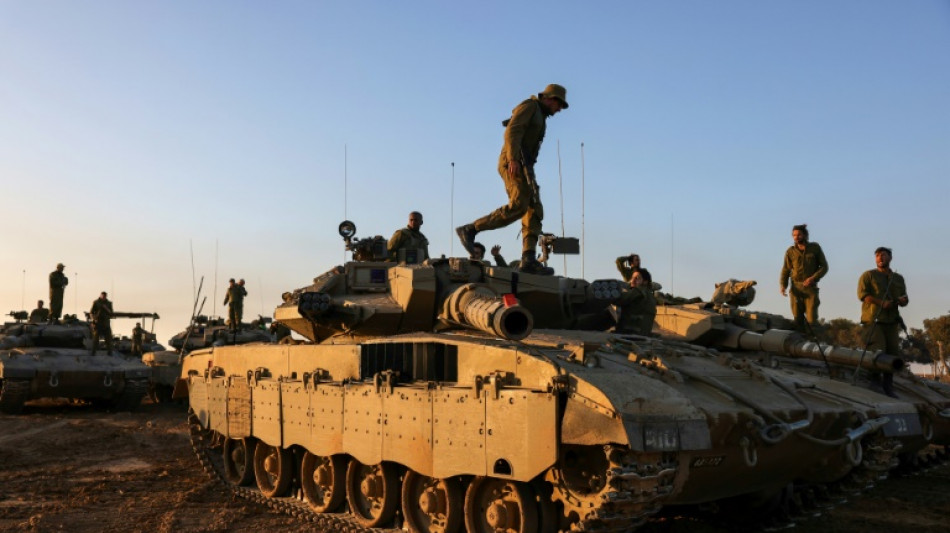
AZN
1.3700

Efforts intensified Wednesday to extend a halt in deadly violence in Gaza as a truce was set to expire, with a source saying militant group Hamas was willing to free more Israeli hostages in exchange for Palestinian prisoners.
A current cessation of hostilities was scheduled to end early Thursday after a six-day pause in a conflict sparked by deadly Hamas attacks that prompted a devastating Israeli military offensive in the Gaza Strip.
US Secretary of State Antony Blinken was due to travel to Israel on Wednesday to push for an extension of the pause in fighting, while UN Secretary General Antonio Guterres demanded a more lasting ceasefire.
Gazans are "in the midst of an epic humanitarian catastrophe," Guterres said, after seven weeks of bombing that have left buildings levelled and inhabitants short of food and water.
"Intense negotiations are taking place to prolong the truce -– which we strongly welcome -- but we believe we need a true humanitarian ceasefire," he told a UN Security Council meeting.
Sixty Israeli hostages and 180 Palestinian prisoners have been released under the truce agreement to the joy of their relatives -- but Wednesday also saw fresh reminders of the tragic stakes of the conflict.
Israel's army said it was investigating a report by Hamas's armed wing that a 10-month-old baby hostage, his four-year-old brother and their mother had all been killed in Gaza.
The military was "assessing the accuracy of the information", it said in a statement.
"Hamas is wholly responsible for the security of all hostages in the Gaza Strip," it added. "Hamas' actions continue to endanger the hostages, which include nine children."
With tensions high despite the truce, the Palestinian health ministry in the occupied West Bank said the Israeli army shot and killed an eight-year-old boy and a teenager in the territory on Wednesday.
The Israeli army said it was "verifying" the information.
- Hostages out, aid in -
As the pause in hostilities brokered by Qatar, Egypt and the United States entered its sixth day, a source close to Hamas told AFP on condition of anonymity the militant group "informed the mediators that it is willing to extend the truce for four days".
Under that arrangement, "the movement would be able to release Israeli prisoners that it, other resistance movements and other parties hold during this period, according to the terms of the existing truce," the source added.
Speaking after a NATO meeting in Brussels, Blinken said he would be "focused on doing what we can to extend the pause so that we continue to get more hostages out and more humanitarian assistance in".
Israeli media reported that the country's government had received a list of the new group of hostages to be freed on Wednesday in the last round of releases under the current truce terms. There was no official confirmation.
On Tuesday, militants freed 12 hostages from Gaza -- 10 Israelis plus two Thais.
Israeli in turn released a further 30 Palestinians, sparking joyous scenes in the West Bank.
Those exchanges followed the extension of an initial four-day truce period.
Hamas has released more than 20 other hostages outside the scope of the truce agreement, mostly Thais.
On Wednesday, Hamas said it had handed over two more women hostages with Russian citizenship to the Red Cross in Gaza in a gesture to the "efforts" of Russian President Vladimir Putin.
Some of the hostages in Gaza are in the hands of another Palestinian militant group, Islamic Jihad.
Its spokesman Musab al-Breim told AFP on Tuesday that "the war is now continuing in indirect negotiations with the Israeli occupier".
He said his group and Hamas were "committed" to respecting the truce agreement "as long as the occupier does so, and we are ready to pursue a political route to make the occupier pay".
- 'Risk of famine' -
The truce deal brought a temporary halt to fighting that began on October 7 when Hamas militants poured over the border into Israel, killing 1,200 people, mostly civilians, and kidnapping about 240, according to Israeli authorities.
Israel's subsequent air and ground campaign in Gaza has killed nearly 15,000 people, also mostly civilians, according to Hamas officials, and reduced large parts of the north of the territory to rubble.
The World Food Programme has warned that Gaza's population faces a "high risk of famine if WFP is not able to provide continued access to food."
Conditions in the territory were "catastrophic", the agency's Middle East director Corinne Fleischer said.
A spokesman for the UN children's agency UNICEF said aid entering Gaza under the truce deal was "not even enough for triage", or emergency care.
The spokesman for the Hamas-run territory's health ministry, Ashraf al-Qudra, told AFP Wednesday that doctors found five premature babies dead in Gaza City's Al-Nasr hospital.
"I discovered that my house had been completely destroyed -- 27 years of my life to build it and everything is gone!" said Taghrid al-Najjar, 46, after returning to her home in southeastern Gaza.
"For two days I couldn't eat, then I told myself that I had to continue living," she told AFP. "My house is destroyed but my children are alive, so we will rebuild."
- Call for aid -
Israel has made clear it sees the truce as an interlude to ensure hostage releases before its war to destroy Hamas continues.
Blinken said he believed an extension was in Israel's interest.
"They're also intensely focused on bringing their people home, so we're working on that," he said.
Chinese Foreign Minister Wang Yi told the Security Council: "Resumed fighting would only, most likely, turn into a calamity that devours the whole region."
burs-rlp/hkb
A.El-Sewedy--DT